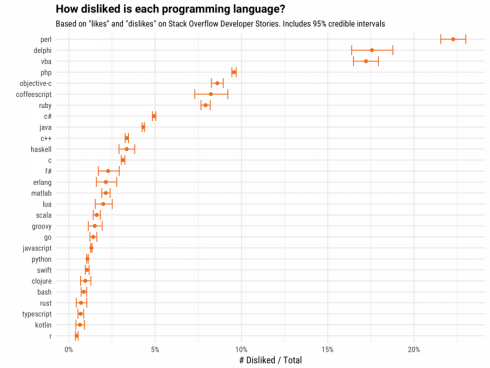
There are plenty of resources and reports on the top programming languages developers want to work with, but what about the top languages they want to avoid? Stack Overflow is releasing new data to explore the most disliked programming languages.
The data comes from Stack Overflow Jobs Developer story data where developers have added tags on the type of technologies and languages they do and do not want to work with. “As a measure of how polarizing each tag is, we’ll look at what fraction of the time it appears in someone’s Disliked tags compared to how often it appears in either someone’s Liked or Disliked tags. Thus, 50% would mean a tag was disliked exactly as often as it was liked, while 1% means there were 99 people who liked it for each one who disliked it,” David Robinson, data scientist at Stack Overflow, wrote in a post.
When it comes to programming languages, the most disliked languages include Perl, Delphi, VBA, PHP, Objective-C, Coffeescript and Ruby. Some of the most liked programming languages included: R, Python, Typescript, Go and Rust. Robinson notes this could be because they are the fast-growing in terms of activity.
The data also looks into the most disliked technologies overall. The list includes Internet Explorer, Visual Basic, Flash, COBOL, Fortran and Pascal. The top universally liked technologies included: machine learning, Git, Python 3.x, HTML5 and CSS3.
“It’s worth emphasizing again that this is no indictment of the technologies, their quality, or their popularity. It is simply a measurement of what technologies stir up strong negative feelings in at least a subset of developers who feel comfortable sharing this publicly,” Robinson wrote.
In addition, the data looked at type technology rivalries in the industry. “This highlights some of the “rivalries” underlying the software ecosystem: Linux and OSX vs Windows, Git vs SVN, vim vs emacs and (unsurprisingly to me) R vs SAS. Most of these pairs don’t represent ‘opposite’ technologies, but instead reflect two approaches to similar problems,” Robinson wrote.






